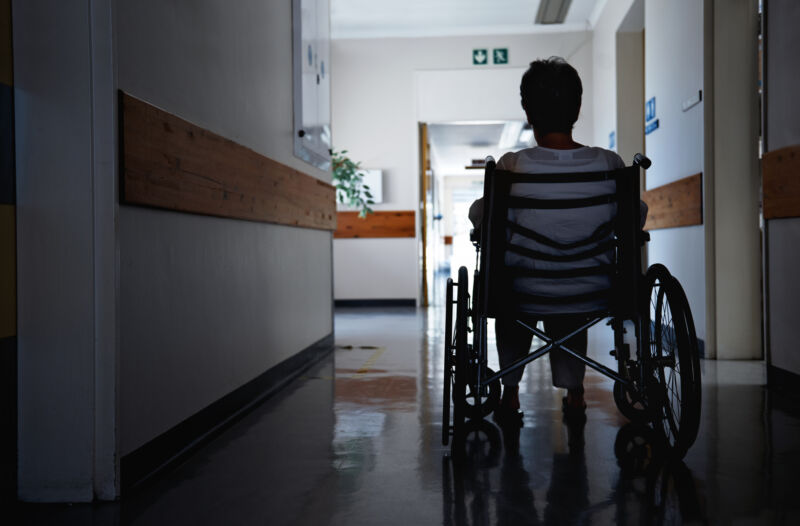
Ben Salentine, associate director of health sciences managed care at the University of Illinois Hospital and Health Sciences System, hasn’t been weighed in more than a decade. His doctors “just kind of guess,” his weight, he said, because they don’t have a wheelchair-accessible scale.
He’s far from alone. Many people with disabilities describe challenges in finding physicians prepared to care for them. “You would assume that medical spaces would be the most accessible places there are, and they’re not,” said Angel Miles, a rehabilitation program specialist with the Administration for Community Living, part of the U.S. Department of Health and Human Services.
Not only do clinics often lack the necessary equipment—such as scales that can accommodate people who use wheelchairs — but at least some physicians actively avoid patients with disabilities, using excuses such as “I’m not taking new patients,” or “you need a specialist,” according to a paper in the October 2022 issue of Health Affairs.
The work, which analyzed focus group discussions with 22 physicians, adds context to a larger study published February 2021, also in Health Affairs, that showed only 56 percent of doctors strongly welcomed patients with disabilities into their practice. Less than half were confident or very confident that they could provide the same quality of care to people with disabilities as they could to other patients. The studies add to a larger body of research suggesting that patients with a variety of conditions that doctors may deem more difficult to treat often struggle to find quality care. The Americans with Disabilities Act of 1990, or ADA, theoretically protects the one in four adults in the United States with a disability from discrimination in public and private medical practice, but enforcing it is a challenge.
Laura VanPuymbrouck, an assistant professor in the Department of Occupational Therapy at Rush University, said the 2021 survey was “groundbreaking. It was the crack that broke the dam a little bit.” Now, researchers are hoping that medical schools, payers, and the group that accredits hospitals, the Joint Commission, will push health care providers for more equitable care.
Information about the health care of people with disabilities is limited, due in part to scant data, according to Tara Lagu, co-author of both the 2021 and 2022 papers and director of the Institute for Public Health and Medicine’s Center for Health Services & Outcomes Research at the Feinberg School of Medicine at Northwestern University. The few studies that have been done suggest that people with disabilities get less preventive care and have worse outcomes than their non-disabled counterparts.
About a decade ago, Lagu was discharging a patient who was partially paralyzed and used a wheelchair. The patient’s discharge notes repeatedly recommended an appointment with a specialist, but it hadn’t happened. Lagu asked why. Eventually, the patient’s adult daughter told Lagu that she hadn’t been able to find a specialist who would see a patient in a wheelchair. Incredulous, Lagu started making calls. “I could not find that kind of doctor within 100 miles of her house who would see her unless she came in an ambulance and was transferred to an exam table by EMS,” she said, “which would have cost her family more than $1,000 out of pocket.”
In recent years, studies have shown that even when patients with disabilities can see physicians, their doctors’ biases toward conditions like obesity, intellectual disabilities, and substance use disorders can have profound impacts on the care they receive. Physicians may assume an individual’s symptoms are caused by obesity and tell them to lose weight before considering tests.
For one patient, this meant a seriously delayed diagnosis of lung cancer. Patients with mobility or intellectual challenges are assumed to be celibate, so their providers skip any discussion of sexual health. Those in wheelchairs may not get weighed, even if they’re pregnant, a time when tracking one’s weight is especially important because gaining too little or too much weight can put the baby at risk of developmental delays or the mother at risk of complications during delivery.
These issues are well-known to Lisa Iezzoni, a health policy researcher at Massachusetts General Hospital and professor of medicine at Harvard Medical School. Over the past 25 years, Iezzoni has interviewed about 300 people with disabilities for her research into their health care experiences and outcomes, and she realized that “every single person with a disability tells me their doctors don’t respect them, has erroneous assumptions about them, or is clueless about how to provide care.” In 2016 she decided it was time to talk to doctors. Once the NIH funded the work, she and Lagu recruited the 714 physicians that took the survey for the work published in 2021 in Health Affairs.
Not only did many doctors report feeling incapable of properly caring for people with disabilities, but the vast majority held the false belief that those patients have a worse quality of life, which could lead to offering fewer treatment options.
During that study, Iezzoni’s team recorded three focus group discussions with 22 anonymous physicians. While the open-ended discussions weren’t included in the initial publication, Lagu said she was “completely shocked” by some of the comments. While some doctors in the focus groups welcomed the idea of additional education to help them better care for patients with disabilities, others said they were overburdened and that the typical 15-minutes allotted for office visits is not enough to provide the patients with proper care. Still others “started to describe that they felt these patients were a burden and that they would discharge patients with disability from their practice,” she said. “We had to write it up.”
The American Medical Association, which is the largest professional organization representing doctors, declined an interview request from Undark, and would not offer comments on the two Health Affairs studies. When asked about the organization’s policies on caring for patients with disabilities, a representative pointed to the AMA’s strategic plan, which includes a commitment to equity.








